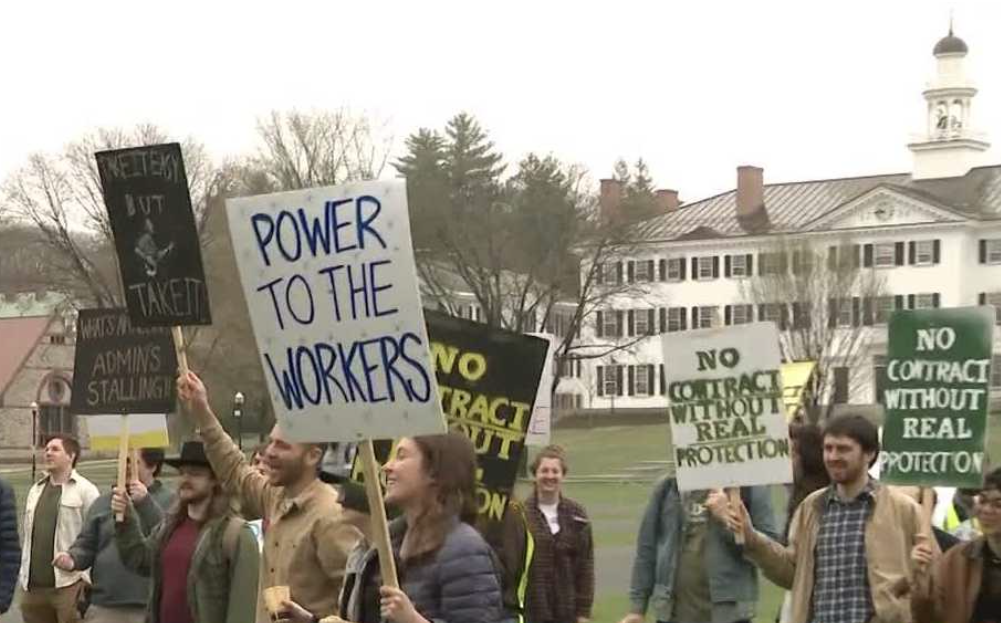
The Dartmouth Graduate Students Union (Gold UE) has been engaged in dialogue with Dartmouth College for over a year in the interest of securing, among other things, higher wages, better quality of childcare, and a wider degree of coverage for health issues. With no agreement between the college and the union—despite extensive acquiescence from the college—the union voted to go on strike roughly a month ago. Since then, the college has been scrambling at the loss of a bulk of its workforce, and has since sat at the negotiating table with the union.
If one is interested, the graduate students are outside every day during normal business hours protesting on the green near the crosswalk. Although the protests are rather sparsely attended, they always have a plethora of cookies and juice boxes to keep its members satiated. Rumor has it that the kindergarten snack time-esque setup was established to ensure that the protestors do not begin to direct their yawps at the union leaders, lest they direct complaints away from the college itself.
While advocating for better workers rights in itself can be considered a noble cause, it is important to consider the mission of the union beyond its traditional activism. Although ostensibly founded solely for the purpose of securing a better standard of living and working conditions for its members, the union has made clear that their goal is to raze Dartmouth College’s traditions to the ground as they stand, stating that “Dartmouth’s history is rooted in racism, patriarchy, and colonialism. We believe that the only way to deconstruct this archaic system and build an equitable and just institution in its place is through collective action.”
The average Dartmouth student is more than amenable to the cause of protestors and labor organization, but the strikers of this particular cause lost enormous support among students earlier this term when their leaders tactfully decided that the most effective way to ensure better child care was to block delivery trucks from reaching Hinman, cutting off the entire student population from receiving any shipments. In an outcome that nobody could have predicted, when this brilliant idea somehow resulted in a loss of support for the strikers among the student body, the strikers returned to Hinman again days later to detriment their cause further. Considering that certain students rely on Hinman for critical resources such as prescriptions, it is ironic that the way in which the protestors have chosen to protest their current living conditions is to worsen the living conditions of the peers that they claim to be fighting for.
According to the Gold UE’s official website, the union has already made significant progress in getting Dartmouth to agree to demands related to workplace misconduct and greater resources for international students; however, on matters related to healthcare coverage and the right to go on strike, the two parties have remained unable to reach an agreement. The union appears to be taking a “my-way or the highway” approach to many of its demands; on the Provost’s website is listed several concessions that the college has made to the union over the last several months, as well as multiple areas in which the college has reported being open to further discussion.
Evidently, the union has not taken kindly to such a half-measure.
Since a great many members of the union are work in an academic setting—such as by serving as TAs and by lending academic support—DSG has concluded that the strike, which has been ongoing for more than a month at this time, is going to severely diminish the ability for undergraduate students to receive the academic support that they are entitled to. The strikers have included a demand to retain their ability to strike “in the case of serious violations of their contract or unfair labor practices” – something that the leaders of the union have evidently chosen to interpret very, very broadly.
As a result, students are suffer- ing due to the disputes between workers and their employers. Quite frankly, a no-strike clause within future contracts could ostensibly serve to prevent students from losing out on their educational experience.
Nobody can claim that the only people who benefit from a no-strike clause in the contract are the employers of the strikers. Dartmouth, after all, as a 501(c) (3) does not afford any profits it makes to its shareholders.
Although DSG, in their cam- pus-wide email regarding the strikes, have advised students that one of the ways they can support the union is by “not accepting teaching/grading positions or other work tradi- tionally reserved to graduate TAs.” The sentiment of such advice is questionable, consid- ering that this school is meant to serve, first and foremost the students—more specifically, the undergrads.
Our school retains the “Col- lege” part of its name to make clear that its priority is the undergraduate program—to that end, it is most important that the students remember that any action that would reduce prioritizing the undergraduate experience would run counter to the mission of Dartmouth.
Conversely, all such profits only go towards bettering the educational opportunities for Dartmouth students. With the end of the term in sight and no conclusive agreement made, it is expected that these protests will continue into the summer term. Perhaps the prospect of work- ing in air-conditioned build- ings as opposed to sitting in the sweltering heat all day long will compel the strikers to end their protests earlier than expected.

Be the first to comment on "Graduate Workers Strike Rapidly Loses Undergraduate Support"